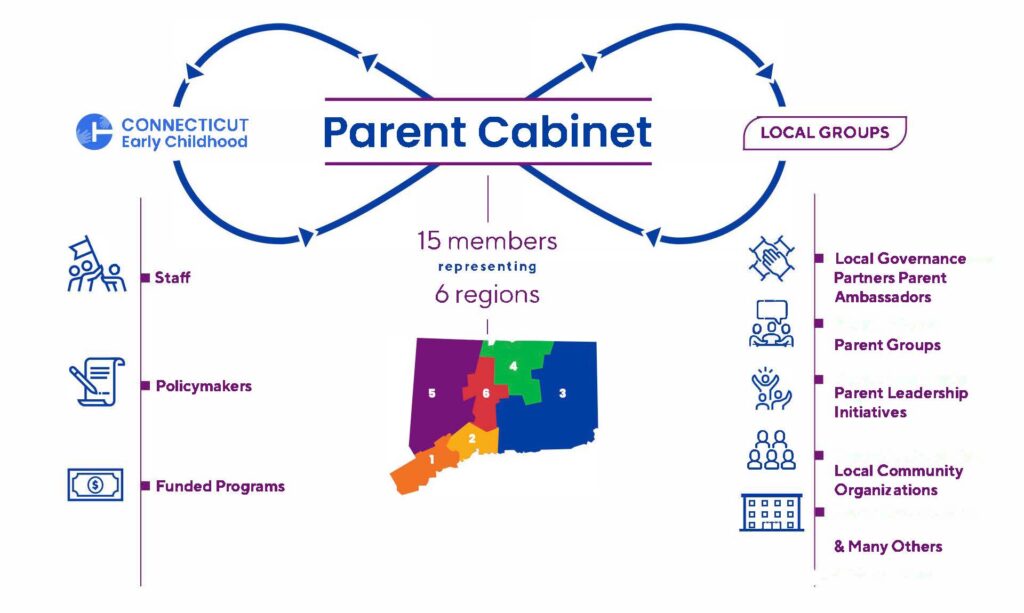Responsibilities and Requirements
All Parent Cabinet members must:
- Live in Connecticut
- Not be employed by the CT Office of Early Childhood (CT OEC) or receive funding from CT OEC
- Commit to a 2.5 year term with some members staggered to help with transition
- Sign an Ethics & Confidentiality Agreement form and Photo Waiver
- Take part in onboarding training
- Sign a W-9 to receive compensation
- Complete monthly reports to track activities and outcomes
All members receive compensation at 25$ an hour. They receive onboarding training as well as technology and coordinator support.
Members spend up to 98 hours per year on the following:
6-9.5 hours monthly estimate:
- Virtual monthly Parent Cabinet meetings and subcommittee meetings
- Community Outreach: Attend or host community or parent group meetings and events; and complete monthly reports to track activities and outcomes
- Quarterly meet with Parent Ambassadors from Local Governing Partner’s (LGPs)
12 additional flexible hours as needed for:
- Community outreach
- Subcommittee meetings
- Advisory Committee Meetings
- OEC check-ins
Learn more about what the Parent Cabinet has been involved in our Newsletters, Data, Plans, and Reports page and past meeting minutes on our Meeting Information page.
Community Outreach Feedback Loop
Parent Cabinet members help create a feedback loop to the local level in their regions to local Parent Ambassadors, Parent Groups, Community Groups, and others. Parent Ambassadors are trained parent leaders within Early Start CT Local Governance Partner’s (LGPs) in the community who serves as a trusted messenger for families and supports parents and families across the entire community. Members also are working to reach areas in the region where there are not currently Local Governing Partners to help uplift parent voice in those areas.

Members build connections within the community to strengthen engagement and ensure that the voices of all families are heard—particularly around systemic barriers such as access, affordability, and other early childhood needs. These insights are elevated to inform the work of the Office of Early Childhood (OEC) and the Parent Cabinet by:
- listening to the biggest needs or barriers across regions to bring to the state level Parent cabinet and OEC to inform partnership work and decision-making
- sharing OEC resources and services
Regional Parent Cabinet members will often partner together to coordinate around region findings and as another support to strengthen parent leadership. Members will also partner together and with their local Parent Ambassadors to:
- to convene community cafe’s, parent groups or table at events to help spread awareness of OEC programs and services
When members partner with local Parent Ambassadors, who are deeply rooted in their respective communities, it strengthens parent leadership efforts and helps members better understand the unique needs and concerns of families in different areas.
This is an evolving process to continue improving communication and effectiveness
Subcommittees & Advisory Committees
Subcommittees
There are subcommittees to help accomplish specific work outside of the full Parent cabinet meetings. There is an OEC staff and Parent Cabinet member co-chair. Members all serve on at least 1 subcommittee. These currently are:
- Children with Special Needs
- Governance
- Community & Parent Engagement
- Access & Affordability of Early Childhood Services
- Data
Advisory Committees
Some members as an elevated leadership opportunity sit on other advisory committees as a parent cabinet member both informally and formally through statute. These committees include other state agency officials, legislators, parents, OEC staff, Early childhood professionals etc. Members uplift parent voice in these bodies and bring back to the whole Parent cabinet key areas to help inform and advise. These Committees include:
Informal:
- OEC External Steering Committee
- CT Statewide Inclusion
- CT ELDS Update Planning Committee
Formal in Statute:
- Birth to Three System Interagency Coordinating Council
- Early Childhood Education Advisory Board
- CT Early Childhood Cabinet
Recruitment and Selection
Want To Apply?
Applications are open every other year. Stay Tuned.
How are members chosen?
OEC creates a selection committee — composed of an OEC staff member, parent cabinet member, and community leader — to select members. Applicants are then evaluated on experience with OEC services and state services, parent leadership, experience in community work, and more.
OEC also makes sure that members are regionally balanced and diverse. The Cabinet has a mix of members:
- Representing different demographics and cultures
- 60% are parents of children age birth to 5 who use OEC programs or services such as Licensed Child Care, Care 4 Kids, Home Visiting, Birth to Three and more
- 40% are those parents with older children
- Representing six regions of the state (according to the CT Department of Children and Families (DCF) map)
Learn more about current Parent Cabinet members and Past members on our Current Parent Cabinet Members and Alumni page
Want to learn more? Would you like a Parent Cabinet member to attend a meeting you’re hosting?
Contact us at OEC.ParentCabinet@ct.gov. We’ll respond in 1-2 business days.

